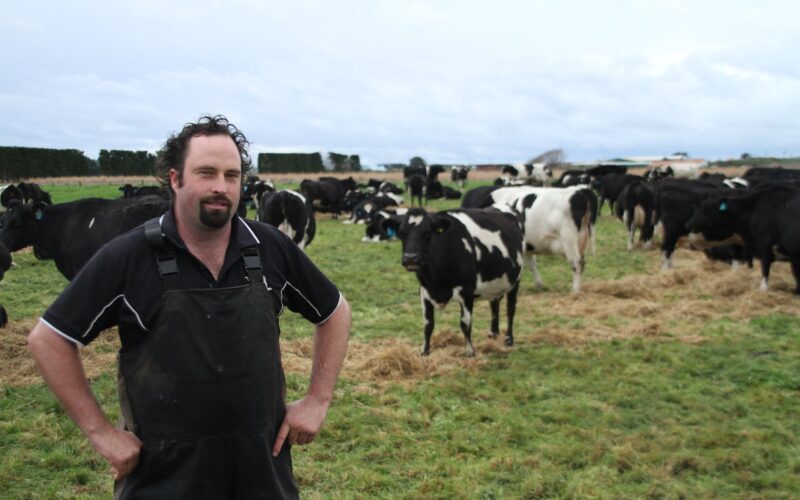Dairy farmers affected by a bad batch of semen deserve far more than just a refund, Federated Farmers dairy chair Richard McIntyre says.
At the end of October, LIC notified affected farmers that it had identified a potential quality concern with 13 out of 39 batches of fresh conventional Premier Sires straws inseminated on farms on October 19.
It has since confirmed that those 13 batches resulted in a higher number of returning cows than normal from inseminations done on October 17, 18 and 19. It has also identified problems with batches use on-farm on October 23, 24 and 25.
“We are not happy with this outcome and have made the decision to fully refund the cost of the straws from those 13 batches,” LIC’s Malcolm Ellis told farmers by email.
McIntyre says LIC are to be commended for spotting the problem and letting affected farmers know quickly.
“We understand things can go wrong because they’re dealing with a biological product. Their communication has been excellent and it’s allowed farmers to put plans in place to respond to a potentially higher non-return rate.”
However, the semen failure hasn’t gone down well with affected Federated Farmers members who’ve contacted him, McIntyre says.
“Many farmers feel that simply refunding the semen charge is insignificant compared to the cost of the lost days in milk, potentially higher empty rate, and potential loss of replacement calves.
“This could have a major impact on affected farming businesses, particularly farmers who used a synchrony programme and had more of their herd mated on those days.”
McIntyre, who had 18 bad straws used with his own herd, has asked the cooperative to find additional ways to reduce the on-farm impact.
“This semen batch failure and the associated costs currently expected to be borne by affected farming businesses is eroding farmer confidence in their cooperative, its ability to control the quality of its products and its ability to adequately rectify any issues that occur,” McIntyre wrote in an email to LIC.
He says one potential action would be for LIC to supply some short-gestation semen and allow farmers to do an additional week or so of AI.
“That would help get total days in milk back to where they would have been had there not been this semen issue.
“They haven’t done this yet, but we’re certainly having conversations with them and putting some pressure on them to do more than they are currently.”
Turakina dairy farmer Kirk Major, who had 28 CIDR cows inseminated on October 19, says he’ll have to wait another eight weeks for a pregnancy scan to confirm how many are in calf.
“I highly expect there’s only a couple in calf from that 28. Those cows will go to the works.”
LIC has offered to refund the cost of the semen and half the cost of the CIDRs, but Major says that’s a fraction of the cost to his business.
“What we lose from days in milk will be a hell of a lot more.”
Major says he’s incredibly frustrated at the lack of responsibility taken by LIC.
“I understand all firms have stuff-ups, but if my cows get hit on the road, I’ve got to have public liability, and I need to have milk contamination insurance for supplying Open Country. So, I just don’t understand why it’s not the same for LIC.
“Everything we do with LIC they make us accept responsibility, but when the shoe’s on the other foot, nah. It just doesn’t sit well with me.”
McIntyre says product and service failures like this happen every year and aren’t exclusive to any single breeding company.
It’s important for farmers to understand the terms and conditions of their agreements, he says.
“There’s this larger issue where both LIC and CRV have these clauses in their terms and conditions that limit their liability, when they have a failure, to the cost of the product or service.
“Too many farmers don’t understand that this risk is essentially being pushed onto them.”
He says now’s a good time for the breeding companies to rethink this.
“We don’t expect perfection, but we do expect for mistakes to be put right. I think there’s room for them to do something here.”
McIntyre says he’ll keep pushing LIC for a better outcome for affected farmers.
Federated Farmers, New Zealand’s leading independent rural advocacy organisation, has established a news and insights partnership with AgriHQ, the country’s leading rural publisher, to give the farmers of New Zealand a more informed, united and stronger voice. Feds news and commentary appears each week in its own section of the Farmers Weekly print edition and online.
In Focus: Farmers need better response to semen failure
Federated Farmers wants LIC to do more for farmers affected by a dodgy batch of semen.
Dairy chair Richard McIntyre is one of those farmers and he tells Bryan that while LIC is being proactive in addressing the issue, farmers need more from the co-op.










